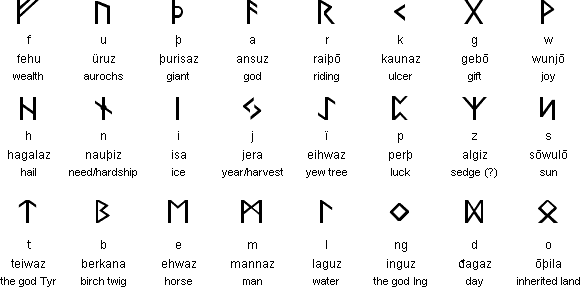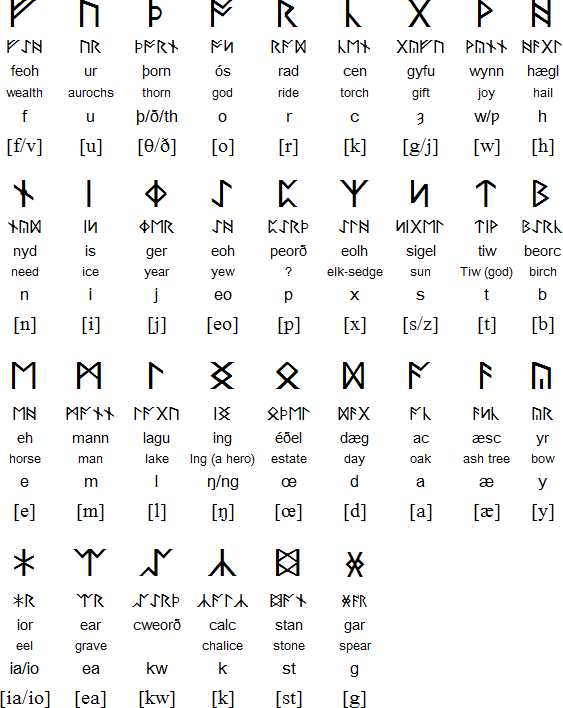|
FUÞORC “Runic Calculator“
For calculating the runic value of words and texts
(Values according to the position of the individual runes in the Anglo-Saxon FUÞORC)
Texts can be entered as runes or (small) Latin letters
The following capital letters are to be inserted for the runes below
 = æ/Æ, (æsc, ash tree) > A = æ/Æ, (æsc, ash tree) > A
 = e/œ, (ethel, estate) > E = e/œ, (ethel, estate) > E
 = g, (gar, spear) > G = g, (gar, spear) > G
 = eo, (iw, eoh, yew tree) > I = eo, (iw, eoh, yew tree) > I
 = eo/io, (ior, eel/snake) > J = eo/io, (ior, eel/snake) > J
 = k, (cealc, chalk/chalice) > K = k, (cealc, chalk/chalice) > K
 = ng, (ing, [God]Ing) > N = ng, (ing, [God]Ing) > N
 = ng, (cweorth, fire) > Q = ng, (cweorth, fire) > Q
 = ð/Ð (thorn, thorn) > T = ð/Ð (thorn, thorn) > T
 = s, (stan, stone) > Z = s, (stan, stone) > Z
þ correspopnds with T and æ with A.
Dots, i.e. marks which are occasionally used to seperate words and/or to fill up the numeric value can be entered as numbers (max. 5).
Example:
fisc 1 flodu1 ahof on fergenberig warT gas2ric grorn TAr he on greut giswom hronAsban
or enter as runes:
Test:
Copy the text and enter it into the "runic Calculator". Finish with ENTER.
The result should be 720
Runic Calculator for texts in the Anglo-Saxon fuþorc
Runensumme berechnen
The values of formulas kept in the runes of the Elder fuþark (partially different in value) can be figured with the calculator below.
Runic Calculator for texts in the Elder fuþark
Runensumme berechnen
The Runes of the Elder Fuþark
The fuþark of 24 runes is divided into 3 groups of 8 runes each (3 ættir).
Each row of 8 renders one ætt.
The runic row seems to reflect a calendar as the 12th rune  jera stands for "year", jera stands for "year",
which points at a solar year of 12 months, while - counting backwards - the rune  jera would be jera would be
number 13, thus hinting at a lunar year.
For more on that refer to A Luni-Solar Calendar

Grafik nach Simon Ager, "Omniglot - writing systems and languages of the world". 2009-02-30. www.omniglot.com
The Anglo Saxon Fuþork
The Runic row was extended up to eventually 33 symbols, probaly due to numeric reasons.
The Thames Scramasax knew only 28 runes while the Runic Poem recorded 29 letters.
 may take position 24 in the rune row (Franks Casket) while may take position 24 in the rune row (Franks Casket) while  appears in place 23. appears in place 23.

Ager, Simon. "Omniglot - writing systems and languages of the world". [2009-02-30].
Omniglot; was first published on the web in November 1998).
Þ
|






